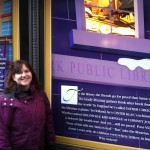Jennifer Reisch, Head Editor, INALJ NYC
The Transformative Powers of Library School
 On the day that my son turned 8 I turned into an idiot. I spent years lost in the abyss of stupid ideas, ridiculous requests, inability to comprehend even the simplest ideas. Really, it was a mystery, even to the know-it-all himself, how two dolts like my husband and me could have possibly spawned such a brilliant boy. Unlike Mark Twain’s father, however, I did not have to wait until my son turned 21 to astonish him with how much I had learned. His opinion of my mental capacity began to change just a few years later when I began library school.
On the day that my son turned 8 I turned into an idiot. I spent years lost in the abyss of stupid ideas, ridiculous requests, inability to comprehend even the simplest ideas. Really, it was a mystery, even to the know-it-all himself, how two dolts like my husband and me could have possibly spawned such a brilliant boy. Unlike Mark Twain’s father, however, I did not have to wait until my son turned 21 to astonish him with how much I had learned. His opinion of my mental capacity began to change just a few years later when I began library school.
The change in his evaluation of my mental capacity started with a population graph. He needed local population statistics from the 1850s through the present day for a school project and he couldn’t find the information anywhere. It took me about five minutes to come up with an actual graph made by a teacher in a nearby school district showing the exact information he needed. Then came the dilemma: Was I his mom doing his homework for him or a librarian helping him find the information he needed? I went with librarian and showed him the graph. He used it on his poster, correctly attributing the source, of course! For a while I spent a lot of time contemplating my dual role as parent and librarian but now I know that helping anyone find needed information (or helping sort out proper citation styles) is not doing that person’s homework.
Since my early days in library school, my son’s faith in my speedy ability to find useful information—and its apparently positive effect on my mental capabilities— has only grown. But his faith in himself has grown as well as he has learned his own strong search strategies. He has even started helping some of his classmates find the information they need as well. He has always been an avid reader and very interested in learning a lot about things that interest him. I do believe his love of learning will last his lifetime and that his improving skills in accessing and assessing information can only help take him deeper on that journey. And while he loves (and utilizes) Wikipedia as much as anyone else does, he recognizes it as a starting point, not the source of all knowledge.
Last week he spent three days at a nearby university working on a big research project for one of his high school classes. At the end of the first day he came home and asked me to show him how to limit his search results in the school’s databases to articles on quantum physics he could actually understand. He didn’t ask if I could limit his results in a useful way—he assumed I could, and that once I showed him how he could as well. He may think that library school made me smarter—and for that I am grateful—but the truth of the matter is that it has made him a lot smarter, too. He finds better information faster for his school work, and he doesn’t hesitate to go looking for information he wants to explore for himself.
I think my son would make a great librarian. But I am definitely smart enough not to tell him that!